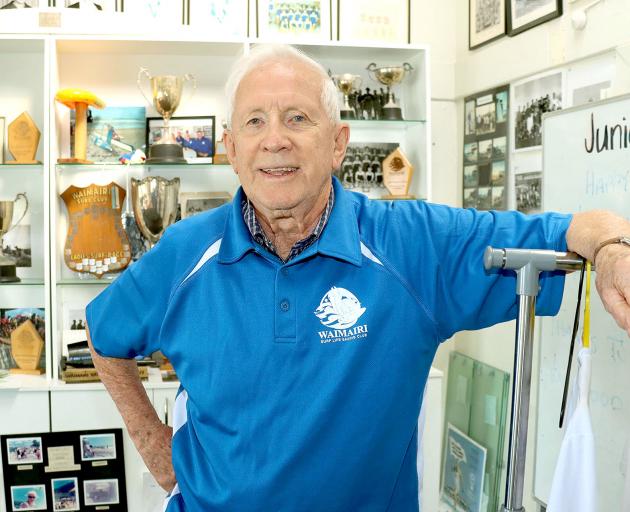
Now 87, John is the patron and last remaining original member of the Waimairi Surf Life Saving Club, which celebrated its 75th jubilee over the weekend.
“It was marvellous,” John said.
“We had a huge crowd out at the beach for club day on Sunday - about 150 people, and for the dinner, 120 people.
“Getting together with one another and the chance to talk about old times.
“Some people hadn’t talked to each other for 40 or 50 years and it is amazing how much people have changed - it was a great success that brought so many people together.”
Rewind to 1949, and John was a 12-year-old Somerfield School pupil and a keen swimmer.
“My father had returned from the war the year before and was building a bach out at Waimairi, so I spent lots of time down at the beach,” John said.
“I had heard some guys, older guys in their 20s, were starting up a surf club so I poked my nose through the door and they asked if I wanted to be the first schoolboy member of the club and I said ‘yes’.”

There isn’t a role at the club he hasn’t filled at some time or another.
“I’ve done committee, coach, president, canoe captain, delegate and life member of the club, even the janitor cleaning up the rubbish during a competition meet,” John said with a chuckle.
“There was a lot to keep me there. As I got older, understanding more about the admin side, it becomes about safeguarding the club and the beach.
“You meet lifelong friends and make lifelong memories, that community calling gets in the blood and it keeps that lifelong interest.”
John was also a fierce competitor, winning “numerous” Canterbury titles and three New Zealand titles.
“In 1957 and 1959 I won NZ surf canoe titles and in 1970, the NZ surf rescue title. The late 1950s would’ve been my peak in my early 20s.”
John estimates he has been involved in 25-30 rescues over the years.
“Some have been short and sharp, you sprint in and grab them out. Others could be half a mile (out).”
One rescue attempt has stayed with him for more than 50 years.
On December 29, 1970, John tried to save 14-year-old Clifford Hobbs who was caught in a rip at Waimairi Beach.
“It was a high summer day, and the beach was packed,” John said.
“I was training on the beach when a kid came up and pointed out where a boy was in trouble in the inshore channel about 30-40m out and about 200m south of the surf club. The beach was so busy that the on-duty lifeguards hadn’t seen him.”
John explained the dangers of the channel at Waimairi.
“It slopes down about 15 metres out and when the tide recedes, it causes rips and that has always been our problem. Your feet can be firmly on the sand and then you take a step back and there is a drop.”
He said Hobbs had been caught between two breaking waves.“I went out there but I was buggered from the run. I got close to him and he was bobbing up and down then he disappeared under the water.
“I tried to dive under to get him but the south rip had churned the water all brown and muddy and I couldn’t see anything.”
A trawl net was later cast over the area in hopes of dragging the boy’s body to shore.
“As it was dragging along, we felt something heavy and thought it might be him, but whatever it was rolled out so we waited till he washed up at North Beach, 800m down the beach.”
John also had to break the tragic news to Hobbs’ father, who had briefly left to buy ice cream.
“He got caught in the queue and when he came back he was looking for his son and was drawn to the crowd.
“It was distressing, having to tell him because I had a son who was similar age.”
Another rescue occurred on a holiday in Bali.
“I was out for a morning run, which I always do, and saw a guy in the surf waving his hand. I thought the guy on the beach was his mate waving back and then realised he was in trouble and I went in to rescue him.”

“Surf lifesaving clubs have often struggled to recruit members.
“The clubhouse is old – not damaged by the earthquakes – but it’ll need replacing at some point.”
The club itself John likened to a “big family.”
“Everyone has always got the club’s best interests at heart.”
John’s love for the water continues, even though his involvement with the club is now limited to attending events.
“I walk the beach a lot during the week when it’s quieter. The love for the water never goes away.
“Like anything, the earlier you start something, the easier it is to master.
“Sunny days on the water – it is a lovely pastime to escape the rigours of everyday life.”














